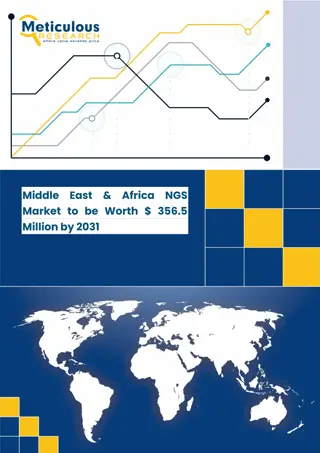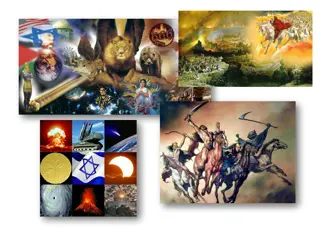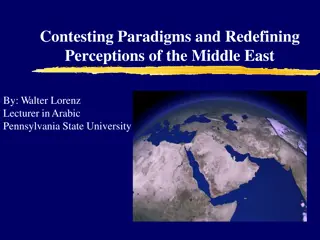
Middle East Turmoil: Historical Perspective and Complex Challenges
Explore the historical background of Middle East turmoil stemming from the division of the Ottoman Empire post-WWI. Delve into the complexities of Western domination, creation of modern Arab world, and ongoing struggles in the region.
Download Presentation

Please find below an Image/Link to download the presentation.
The content on the website is provided AS IS for your information and personal use only. It may not be sold, licensed, or shared on other websites without obtaining consent from the author. If you encounter any issues during the download, it is possible that the publisher has removed the file from their server.
You are allowed to download the files provided on this website for personal or commercial use, subject to the condition that they are used lawfully. All files are the property of their respective owners.
The content on the website is provided AS IS for your information and personal use only. It may not be sold, licensed, or shared on other websites without obtaining consent from the author.
E N D
Presentation Transcript
The Greatest Challenge in the Modern Middle East
Historical Perspective of Middle East Turmoil Much of today s Middle Eastern turmoil can potentially be attributed to the Post-WW I division of the Ottoman Empire To the victors go the spoils England and France were the major players in the Ottoman Empire s divisions with Greece, Italy, Russia, and others playing lesser roles. The USA initially rejected the Treaty of Versailles and did not sign until August 1921 Consequently, the USA was not a major player
After the War to End All Wars WWI formally ended on November 11, 1918 The Treaty of Versailles signed June 28, 1919 The League of Nations chartered January 10, 1920 Secretly during the war, Britan and France met and signed the Sykes Picot Agreement, May 19, 1918 This agreement basically set out the plan for breaking up, partitioning, and managing the territories comprising the Ottoman Empire The Ottoman Empire controlled Palestine from about 1299 until the end of WW I
A Complex Problem The huge conglomeration of territories and peoples was ultimately divided into several new states. The partitioning of the Ottoman Empire after WW I led to the initial domination of the Middle East by Western powers such as Britian and France, and saw the creation of the modern Arab world and the Republic of Turkey There have been complex problems ever since and we are still wrestling with them today
The Map Redrawn New countries were created, or new borders defined of what was the Ottoman Empire, generally between WW I and WW II Iraq, Syria, Lebanon, Saudi Arabia (2 kingdoms became 1), Iran, Yemen, Egypt, (Jordan May 1946) British protectorates, Kuwait, Bahrain, Qatar Greece and Russia added territory to their original national borders Turkey fought a war of independence against British and Greek occupation and became a democratic republic, September 1923 British mandate for Palestine in effect until May 1948
The Nation of Israel Balfour Declaration issued, 2 November 1917, the establishment in Palestine of a national home for the Jewish people. 29 November 1947, UN Resolution 181 end the British Mandate of Palestine and partition into an Arab State and a Jewish State Israel accepted the Resolution, the Arab League did not Israel declared independence on 15 May 1948 Egypt, Jordan, Iraq, Syria, Lebanon invaded, we will push them into the sea.
Victory and Defeat Between February and July 1949 Israel negotiated armistices with each invading Arab State fixing temporary frontiers The Palestinian refugee problem began Israel had captured about 50% of the area allocated as an Arab State in the original UN Partictian Plan Israel titled it the War of Independence Arabs call the conflict Nakba (catastrophe) This was the bloodiest war for Israel to date, with over 6000 fatalities
A Right of Exist? This seems to be THE question concerning Israel s existence today 28 of the 193 UN member nations still do not recognize Israel. Plus, Cuba, North Korea, and Venezuela Palestinian National Authority condemns any agreement with Israel as dishonorable There have been five more Israel national wars since 1948 We must ask: WHAT IF BOTH SIDES HAD ACCEPTED THE UN PARTICIAN PLAN IN 1947?


![READ⚡[PDF]✔ Emerging Space Powers: The New Space Programs of Asia, the Middle Ea](/thumb/21554/read-pdf-emerging-space-powers-the-new-space-programs-of-asia-the-middle-ea.jpg)



















